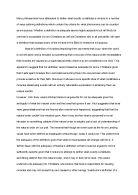No definition of a miracle is adequate. Assess this view
Many philosophers have attempted to define what exactly constitutes a miracle in a number of ways outlining definitions which contain the criteria for what phenomena can be counted as miraculous. Whether a definition is adequate seems highly subjective but will likely be one that is acceptable by non-Christians as well as Christians who in all probability will want a definition that accepts many of the miracle in the Bible to indeed be miraculous. Mackie’s definition of miracles describing them as events that occur when the world is not left alone and is intruded by something that is not part of the natural order necessitates that miracles are caused by a supernatural entity which may be considered to be God. This appears to suggest that his definition would indeed be adequate for some Christians given that it sets apart miracles from coincidences turning them into occurrences which could provide evidence for their faith. Moreover it allows a more specific idea of what constitutes a miracles disallowing events with an entirely naturalistic explanation maintaining them as unique events. However,








